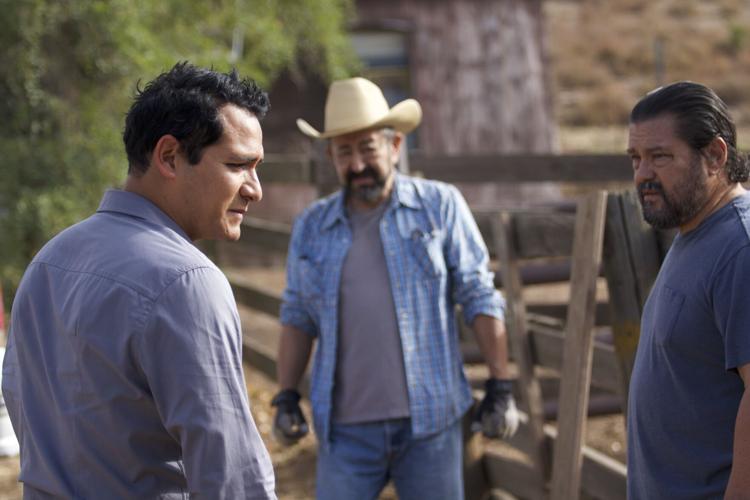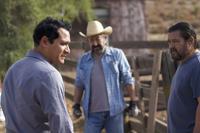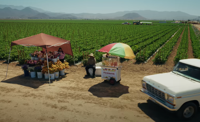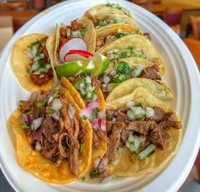
In "The Kill floor," a young Latinx reporter returns to his rural hometown as the COVID19 pandemic threatens the workers at a local meatpacking plant — including his own father. Photo courtesy of Latino Public Broadcasting.
A new digital series of Latino short films will air during February and March that explore the connection communities have with food, dance, labor and the pandemic.
The pandemic transformed our lives in so many ways, we are just starting to process it. The world seemed to stop. The streets were empty, parties were canceled, performances were postponed. But songwriters didn’t stop writing, birds didn’t stop singing and creativity didn’t end.
Carlos Avila, director of the short film “The Kill Floor,” was at the beginning of the pandemic “glued to the news, wondering whether or not we were facing the apocalypse, whether we were going to make it through.”
As he watched and read the news, Avila said one of the stories that caught his attention was what was happening at the meat packing plants. He noticed many of the workers were Latinos.
“Many of these meat packing communities, many are in rural areas… so they are a little bit isolated, they become company towns.”
He relayed that he later spoke to meat packing plant workers, union representatives, activists and reporters and came up with a story that could capture some of the issues that these communities were facing.
Avila was born in Lima, Peru and moved to Echo Park at 2 years old.
“The Kill Floor” will be the first short film to air from the “Voces Shorts” series that will start streaming today. The series was created by Latino Public Broadcasting (LPB) from PBS. The three other films in the series are documentaries.
“These four new shorts offer an eye-opening look into worlds that are rarely explored,” says LPB Executive Director and VOCES Executive Producer Sandie Viquez Pedlow. “From a drama about meatpackers at the front lines of the COVID pandemic to a growing community of Latinos in Alaska, from a dreamlike exploration of identity to an autobiographical look at life in a Texas oil town, this series offers four up-to-the-minute snapshots of the diversity and complexity of Latino life in America today.”

In "Sentir el Son," an Afro-Mexican woman embarks on a journey to discover her racial identity through music and dance. Courtesy of Latino Public Broadcasting
Karla B. Duarte, director of “Sentir el Son” said the idea for the documentary told in first-person form started even before the pandemic, when she noticed West African dances at the park in San Diego where she was born and where she lives now. She was also raised in Tijuana.
She soon realized there was also a West African dance connection in Mexico, so she “presented the idea of highlighting the Afro-Mexican diaspora and celebrating the culture, the music, the dance,” to Franchesca, who became the subject of the documentary as she goes through self-discovery of her Afro-Mexican roots and how she relates to that with her life in Los Angeles, growing up with her Mexican mother. “Sentir el Son” airs February 19.
“When it’s good it’s good,” is a autobiographical short where filmmaker Alejandra Vasquez returns to her hometown of Denver City in West Texas to document how the boom or bust nature of the town’s main industry – oil – fuels the life of the town. "Growing up, I couldn't wait to move out of my hometown, but now I feel a sense of pride and nostalgia when I visit," Vasquez said through email. "I hope audiences feel empathy for oilfield workers and their families. I hope we try to understand each other better instead of pushing away people who may not look like us, or vote like us." Vazquez is a Mexican-American director and producer. Her short documentary airs February 26.
Indra Arriaga Delgado said “Sabor Ártico: Latinos en Alaska” was the perfect story to tell now, because the Latino population in Alaska has grown so much since she moved 20 years ago to Anchorage. Arriaga was born in Xalapa, Veracruz and was 8 years old when she moved to San Antonio, Texas. Her family had a restaurant there called El Bracero, where she said they “served the immigrant community.”
Her documentary shows how Latinos have adapted many recipes from their home countries with ingredients found in Alaska. She said her favorite Alaskan Latino meals include salmon tacos, halibut ceviche and moose albondigas. “Sabor Ártico: Latinos en Alaska” will air March 4.
The short films will be available via streaming on all station-branded PBS platforms, including pbs.org and the PBS app.













(0) comments
Welcome to the discussion.
Log In
Keep it Clean. Please avoid obscene, vulgar, lewd, racist or sexually-oriented language.
PLEASE TURN OFF YOUR CAPS LOCK.
Don't Threaten. Threats of harming another person will not be tolerated.
Be Truthful. Don't knowingly lie about anyone or anything.
Be Nice. No racism, sexism or any sort of -ism that is degrading to another person.
Be Proactive. Use the 'Report' link on each comment to let us know of abusive posts.
Share with Us. We'd love to hear eyewitness accounts, the history behind an article.